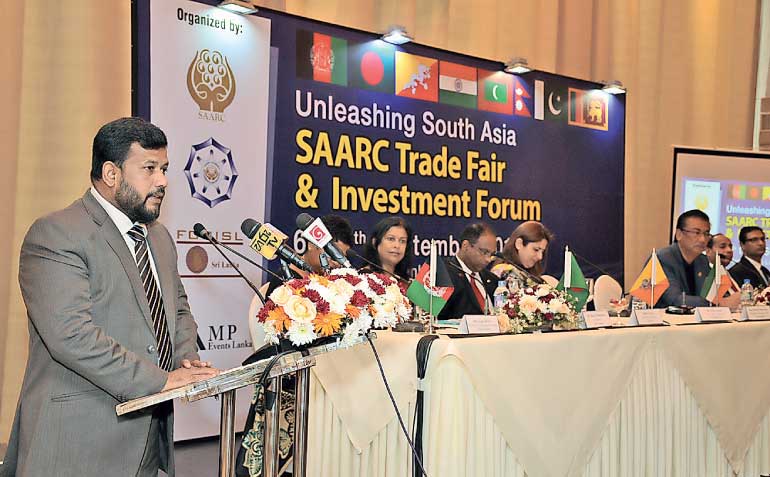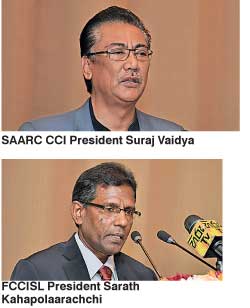Friday Feb 20, 2026
Friday Feb 20, 2026
Monday, 22 May 2017 00:10 - - {{hitsCtrl.values.hits}}
 Industry and Commerce Minister Rishad Bathiudeen addresses the event
Industry and Commerce Minister Rishad Bathiudeen addresses the event
By Charumini de Silva
In a hard-hitting evaluation of the performance of SAARC trade and investment, its Chamber of Commerce and Industry President Suraj Vaidya last week criticised policymakers for failing to formulate a policy to bolster economic integration within the region and urged the Sri Lanka Government to show leadership to initiate it.
He pulled no punches while delivering a speech on ‘Unleashing the potential of South Asia’ at the launch and press conference of the annual SAARC Trade Fair and Investment Forum which will be held from 6-9 September in Colombo, Sri Lanka.
 Presenting his evaluation on SAARC’s 30-year performance, he said it had failed to meet the expectations of its people and termed it an “extremely complex regional body.”
Presenting his evaluation on SAARC’s 30-year performance, he said it had failed to meet the expectations of its people and termed it an “extremely complex regional body.”
“Most South Asian countries cannot invest beyond their own countries and even if we have policies, what are the incentives we give to our people in the region? There is no way that investment or trade will take place in SAARC because the governments are more concerned about security,” he added.
Vaidya pointed out that unless people are allowed to move freely, no trade or investment will take place within the region and this would hinder SAARC’s growth potential.
“We understand the concerns of security. The US give a 10-year visa, the European Union (EU) gives a five-year visa and China gives one for three years. They also have the same kind of security concerns, but they do not let the threat of security hamper the growth and prosperity that business brings along,” he stressed.
He called on the Government of Sri Lanka, which he called “forward-looking and private sector friendly”, to take up this issue at the State level and to at least allow a two-year business visa within SAARC to boost investment and trade within the region.
“Why would the Chinese get preference in South Asia when it is not even part of the fraternity? Is there no security threat from China? Are we, the South Asians, only a threat to ourselves? So how can the economic integration that we talk of really happen?” he queried.
He also pointed out that the region is faced with a severe brain drain over the years as there is less hope in SAARC countries, where remittances become a very important part of economies.
Although policymakers have made it a point that ‘job creation’ is a priority of their respective governments, the reality in South Asia is that the majority of young intellectuals have left their countries and are working in other parts of the world because there is less hope within SAARC.
Vaidya assured that SAARC’s private sector was committed to bringing in significant investments and technology that the region is looking for, as South Asia is the fastest-growing economic bloc in the world at present.
“I think this is a time when smaller countries need to bring about harmony and unity amongst the fraternity of South Asia. Unless we truly allow South Asians to move around freely, the dreams that we talk of a united body, a potential of 1.7 billion people, will be said in speeches and probably will remain in speeches,” he noted.
Industry and Commerce Minister Rishad Bathiudeen also admitted the SAARC President’s observations and acknowledged that trade within SAARC countries was less than 6%.
“As the President of SAARC CCI just said, the brain drain has become an issue in SAARC. We cannot retain skills if we do not have investment and I believe more foreign direct investment FDIs can be sourced for SAARC if we collaborate rather than compete,” he pointed out.

The Minister also admitted that a low time period given for a SAARC visa is also impacting SAARC business and added that a lack of investment and integration in South Asia were also reasons for these obstacles.
Bathiudeen said events such as the SAARC Investment Forum and Trade Fair not only help to expand investment and trade in the region but also create closer relations among members. - Pix by Lasantha Kumara